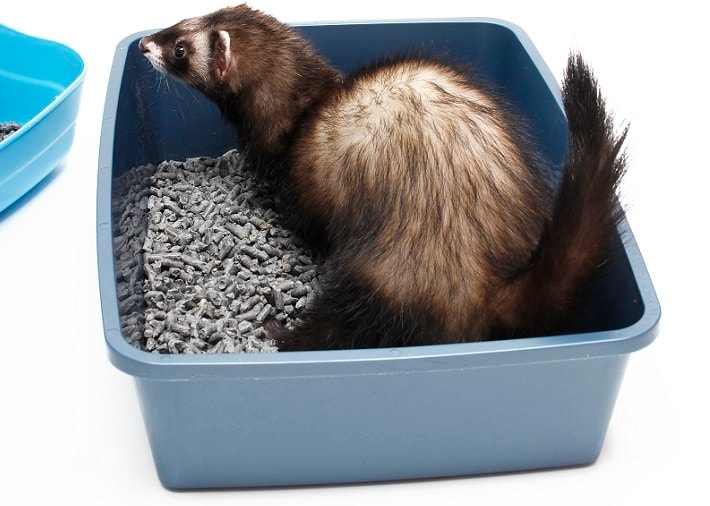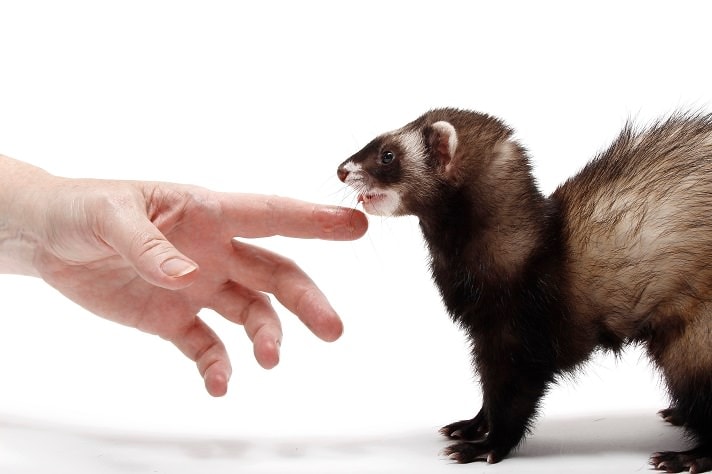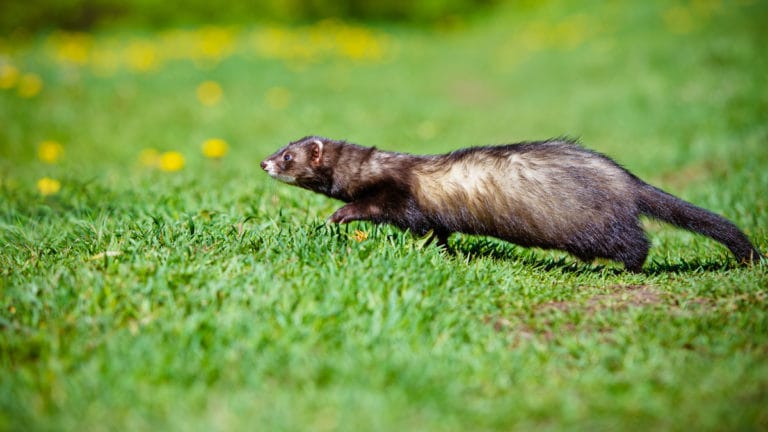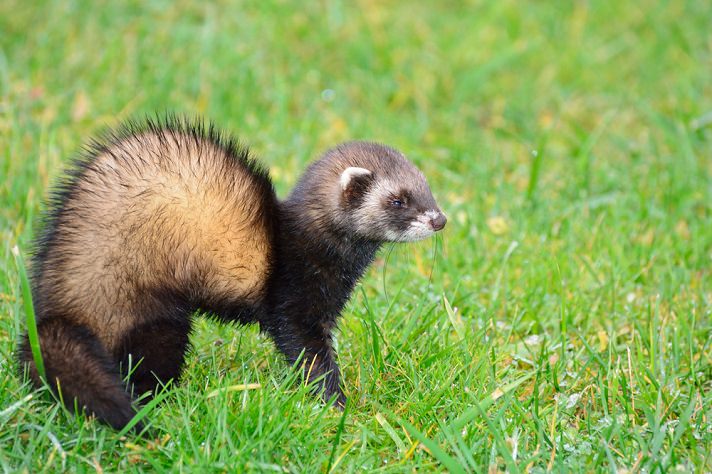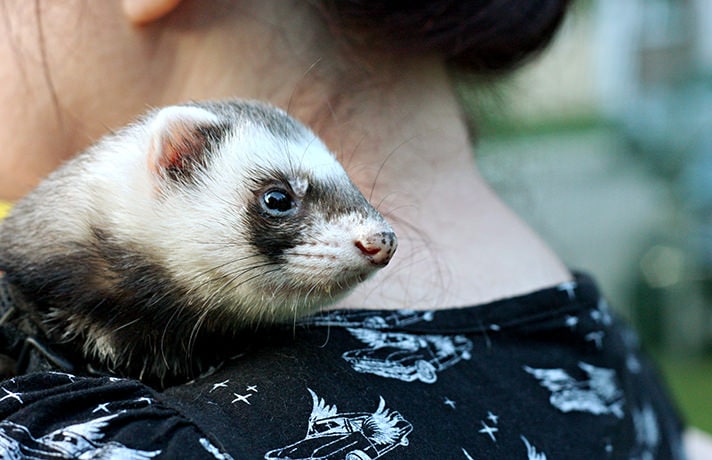A common health problem seen in pet ferrets is hair loss. Hair loss is frequently called baldness; however, the correct medical term is alopecia. Alopecia means partial or complete hair loss from an area that normally has hair. There are different locations for the hair loss depending on the underlying cause of the alopecia.
6 Common Causes Of Ferret Hair Loss
Many conditions cause hair loss in pet ferrets. Frequently alopecia can be related to hormone levels. This will typically produce alopecia that starts at the tail and rump and progresses up the back and sides to the head. External parasites can cause alopecia. Parasitic causes of alopecia often produce hair loss in spots where the ferret can scratch (shoulders/neck) or chew (rump, tail and sides). Infectious causes of alopecia will usually produce small areas of hair loss. Nutritional deficiencies can cause a generalized partial alopecia with a brittle coat.
1. Hormonal Hair Loss In Ferrets
Ferrets go through two seasonal sheds each year. In the spring, ferrets shed their winter coat and put on their thinner summer coat. In the fall, ferrets shed their summer coat and put on their thick winter coat. This normal shedding usually takes about two to three weeks to accomplish and is controlled by the photoperiod and the changing levels of the hormone melatonin.
Similarly intact females and males (not spayed or neutered) will normally shed a lot during the spring/summer breeding season. This is related to the elevated sex hormones (testosterone or estrogen) during the breeding season.
2. Ferret Adrenal Gland Disease
The most common medical problem associated with alopecia in ferrets is adrenal gland disease. This disease is so common that a majority of the pet ferrets in the United States are at risk for developing adrenal gland disease when they become middle-aged to older ferrets.
In this disease, the adrenal glands overproduce the sex hormones (estrogen, progesterone) and androgens. With adrenal gland disease the alopecia commonly starts on the tail and works its way to the rump. If you’re wondering why ferrets lose hair on their tail, this is one common reason. Usually, the alopecia continues to expand forward until it reaches the head, but not all of the adrenal cases have this pattern of hair loss. In addition to hair loss, adrenal gland disease can cause itchy skin, swollen vulvas in females, enlarged prostate in males, anemia, weight loss, muscle loss, aggressive behavior and even sexual behavior.
Adrenal gland disease is easy to diagnose in most cases. Your veterinarian can usually make the diagnosis based on the physical exam. In a few cases bloodwork to measure the adrenal hormone levels may be needed. An ultrasound exam can also be used to see which one of the adrenal glands is enlarged.
Adrenal gland disease can be treated either medically or surgically. Consult with your veterinarian to determine which treatment option is best for your ferret.
Three different options are available to medically control adrenal disease. Lupron is a once-a-month injectable medication that lowers the adrenal hormones and controls the clinical signs. Suprelorin F is a once-a-year implant that lowers the adrenal hormones and controls the clinical signs. Melatonin implants or tablets can be used to lower the adrenal hormones and control the clinical signs. Some cases will respond better when Lupron or Suprelorin F is used with melatonin.
The adrenal gland can also be surgically removed to lower the adrenal hormones and control the clinical signs. Unfortunately surgery is not always a cure. The remaining adrenal gland may start overproducing hormones in the future.
Adrenal gland disease is difficult to prevent because the early spay or neuter that baby ferrets routinely have is suspected to be part of the cause of adrenal gland disease. There is currently a clinical trial testing a vaccine to prevent adrenal gland disease in ferrets; however, it may be several years before this vaccine becomes commercially available. Another option is to start using the Suprelorin implants when the kit (baby ferret) is about 6 months of age, and then repeat yearly to prevent the stimulation to the adrenal glands. This should prevent the adrenal glands from overproducing the adrenal hormones as the ferret becomes older.
3. Ferret Rat Tail
Some ferrets lose all of the hair on their tail. This makes the tail look like a tail on a rat, so it is commonly called “rat tail.” This is common in intact males during the breeding season. Some breeders call it “stud tail.” It is also seen in neutered males and spayed females.
Oftentimes the hair on the tail returns with the next seasonal shed, but the tail alopecia frequently returns with the next shed. Usually this is the very early sign of adrenal gland disease. Consult with your veterinarian about what treatment is appropriate for “rat tail” if you see hair loss on your ferret’s tail.
4. Ferret Hair Loss From Parasites
Fleas, ear mites and skin mites are all possible causes of hair loss in ferrets. Ferrets that spend time outside or play with dogs and cats that go outside can pick up fleas. Fleas will normally make a ferret scratch at the skin above the shoulders and neck, and chew at the sides and rump area. This causes some hair loss areas secondary to the self-trauma from scratching and chewing. Fleas are easy to see and easy to treat. Some of the topical cat flea products can be used. Consult with your veterinarian to decide which flea product is best for your ferret.
Ear mites can be common and cause itchy ears and scratching at the ears. This can cause small areas of hair loss around the ears from the frequent scratching. Ear mites are easy to find using an ear swab and easy to treat. Your veterinarian can prescribe one of two topical medications for cats (Advantage Multi and Revolution) to treat a ferret with ear mites.
Skin mites are uncommon, but ferrets can get sarcoptic mites and Demodex mites. Both of these mites are extremely itchy and result in a lot of scratching. The scratching will cause hair loss over the shoulders and neck. Skin mites can be diagnosed with a skin scraping, and they can be treated with the same medications that your veterinarian uses to treat cats and dogs.
5. Ferret Hair Loss Caused By Infectious Agents
Infectious causes of hair loss in ferrets are uncommon but can include ringworm, yeast and bacterial infections. Ringworm is actually a fungal infection that causes small patches of alopecia, and, in my experience, it is usually acquired from an infected kitten or cat. Ringworm can be diagnosed with a positive Wood’s lamp exam, which uses ultraviolet light, or by a fungal culture just like your veterinarian does with kittens and cats. Ringworm can be treated with the same medications that are used with kittens and cats.
Yeast infections are uncommon, but some older ferrets with other illnesses like adrenal gland disease or cancer can develop a Malassezia skin infection. This will cause hair loss and a crusty appearance to the skin. This occurs most often on the ferret’s face. This can be treated with the same medications that are routinely used in dogs.
Bacterial infections of the skin are uncommon, but some ferrets will develop Staph infections. This will cause hair loss from excessive scratching, especially over the shoulders. Most of these infections can be diagnosed with a physical exam. Fortunately the same antibiotics that your veterinarian uses in cats can be used for ferrets with Staph infections.
6. How Nutrition Affects Ferret Hair Loss
Ferrets require a diet that is high in protein and fat. A diet that does not contain enough protein or fat will produce a generalized thin coat, partial alopecia and a brittle coat. The correct amount of zinc is also needed to prevent alopecia. Nutritional deficiencies can be treated and prevented by offering a high-quality ferret food, which you can find wherever ferret supplies are sold.
By: Jerry Murray
Featured Image: Via Max Moreau/Flickr
Share:

